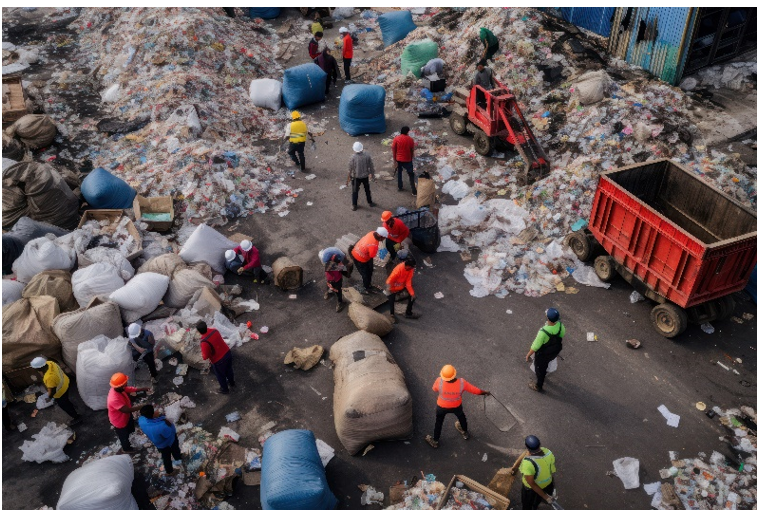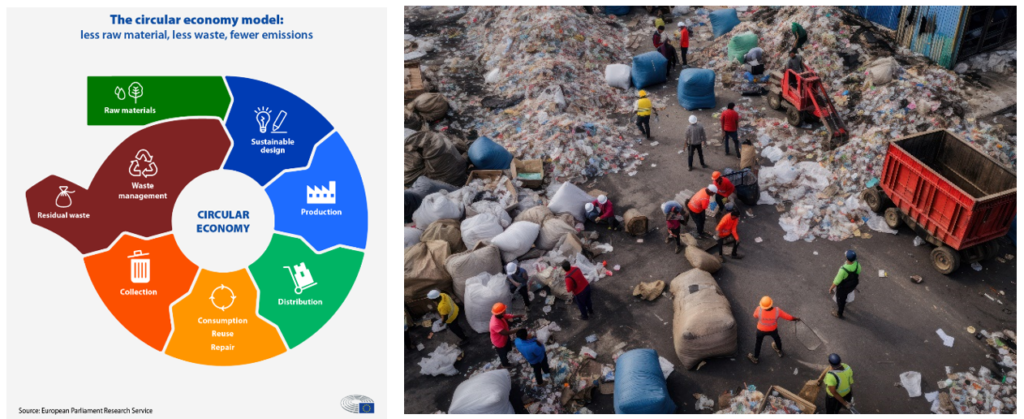
From Waste to Wealth
- Excessive consumption poses a serious threat to the environment and public health
- Accelerating the transition to a circular economy will curb pollution, mitigate business risks, and enhance the quality of life
As the world faces a triple planetary crisis of climate change, biodiversity loss and pollution, the circular economy model offers a promising solution. This approach could encourage emissions reductions while mobilising progress towards other environmental and social goals. Excessive consumption drives over-extraction, leading to scarcity and undermines the long-term viability of businesses.
 European Parliament Research Service
European Parliament Research Service
Photo source: Freepik
Today, resource shortages and price fluctuations present major challenges to firms. A circular economy helps to keep resource use within planetary boundaries. This approach mitigates impacts on human health and the environment while reducing reputational and litigation risks.
Plastic pollution is highlighted as a key issue in Target 7 of the Global Biodiversity Framework. For instance, improper management of plastic waste can lead to long-term ecological damage, water contamination, and soil infertility. In 2022, 175 member states of the United Nations Environment Assembly (UNEA) agreed on a resolution to develop an international legally binding treaty to address the full life cycle of plastics and end plastic pollution.
Southeast Asia is home to six of the 10 biggest contributors to marine plastic pollution. While some countries have well-established recycling programmes, plastic pollution is especially pronounced in developing countries that lack advanced infrastructure to manage it. Without adequate disposal practices, garbage piles up on land and can leak into waterways. Managing waste is a growing public health and environmental issue in urban areas. For instance, the Payatas dumpsite in the Philippines collapsed in 2000 following typhoon rains, destroying a nearby town with 219 fatalities occurring as a result. As nations become wealthier, the issue of consumption and rapid increase in waste will exacerbate the shortfalls of inadequate waste management systems.
As part of the supply chain, manufacturers can reuse raw materials, slowing or closing the resource loop. For example, companies can decouple operations from the extraction of raw materials by focusing on minimising resource consumption and creating value from waste streams as inputs. Expectations from consumers, whose choices are a signal to businesses and a driver for change, are accelerating urgency for more sustainable business processes. The circular economy also provides a framework for governments to balance economic development with sustainability. The Singapore Green Plan 2030 includes a key target to reduce the waste sent to landfill by 30% by 2030. At the same time, industries benefit from clear policy frameworks that provide long-term certainty and encourage investments in circular solutions.
Looking forward
Addressing plastic waste in the region is critical for planetary and human health. At PCM, we support companies that design pollution out of the system by prioritising waste reduction and sustainable resource consumption. Industries drive innovation into new technologies and business models on resource efficiency and waste reduction. Investing in companies that promote circularity in their operations and supply chains can drive SDG 12: Responsible Consumption and Production forward and shift towards a more sustainable economy. This holistic approach can also help reduce plastic pollution, ensure the availability of clean water, and safeguard the water quality of aquatic ecosystems – leading to better outcomes under SDG 6: Clean Water and Sanitation.
Important Information
This material is provided by Phillip Capital Management (S) Ltd (“PCM”) for general information only and does not constitute a recommendation, an offer to sell, or a solicitation of any offer to invest in any of the exchange-traded fund (“ETF”) or the unit trust (“Products”) mentioned herein. It does not have any regard to your specific investment objectives, financial situation and any of your particular needs.
The information provided herein may be obtained or compiled from public and/or third party sources that PCM has no reason to believe are unreliable. Any opinion or view herein is an expression of belief of the individual author or the indicated source (as applicable) only. PCM makes no representation or warranty that such information is accurate, complete, verified or should be relied upon as such. The information does not constitute, and should not be used as a substitute for tax, legal or investment advice.
The information herein are not for any person in any jurisdiction or country where such distribution or availability for use would contravene any applicable law or regulation or would subject PCM to any registration or licensing requirement in such jurisdiction or country. The Products is not offered to U.S. Persons. PhillipCapital Group of Companies, including PCM, their affiliates and/or their officers, directors and/or employees may own or have positions in the Products. This advertisement has not been reviewed by the Monetary Authority of Singapore.
